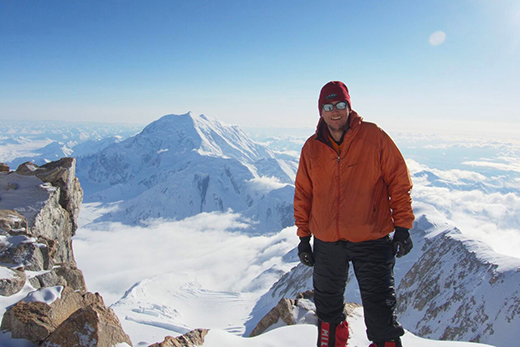In December of 2012, Stefan Lutz summited the 22,841-foot peak of Aconcagua, the highest mountain in the Western hemisphere, located in western Argentina.
“The view from the top was amazing. When you look to the horizon and see the curvature of the Earth, you realize that you’re in a pretty special place,” says Lutz, professor and chair of chemistry at Emory. He is also a dedicated mountaineer who will attempt to climb Mount Everest.
After a few minutes spent admiring the view from atop Aconcagua, it was time to descend. Lutz and a guide maneuvered down a particularly steep section and sat down to wait for the rest of their group.
“It was a beautiful day. I remember drinking and eating a bit of food, just trying to re-energize myself,” Lutz says. “Then I noticed a man, a climber I didn’t know, standing alone, maybe 20 feet away. He just kept standing, still as a statue. It’s exhausting at that altitude and I wondered, ‘Why doesn’t he sit down?’”
Lutz mentioned it to the guide who then approached the man. “As soon as the guide put his hand on the guy’s shoulder, he collapsed,” Lutz recalls.
They gave him some water and asked, “Do you know where you are?”
“Yes,” the man replied, “I’m on Mount Fuji.”
It was clear that the confused mountaineer, a Japanese man climbing solo, was suffering acute mountain sickness. “He was in serious trouble,” Lutz says. “Luckily, some Argentine park rangers came along. They gave him bottled oxygen which helped him recover enough that he could be helped back down the mountain.”
Without the assistance of the rangers, the climber’s condition might have progressed to high altitude cerebral edema − a severe and, if untreated, fatal form of altitude sickness when capillary fluid leaks into the blood-brain barrier due to the effects of inadequate oxygen.
“That’s the highest I’ve climbed – 22,841 feet,” Lutz says. “It’s very humbling. Even a fit person moves like a turtle at that altitude.”
The experience was another stark reminder to Lutz, who is 46, that his passion for climbing comes with great risks along with the rewards.
“It’s not about being a thrill seeker,” Lutz says, trying to explain why he climbs. “As difficult and dangerous as mountain climbing can be, it's also an absolutely wonderful experience. You have to live it to understand it. You get a high from it that stays with you.”

